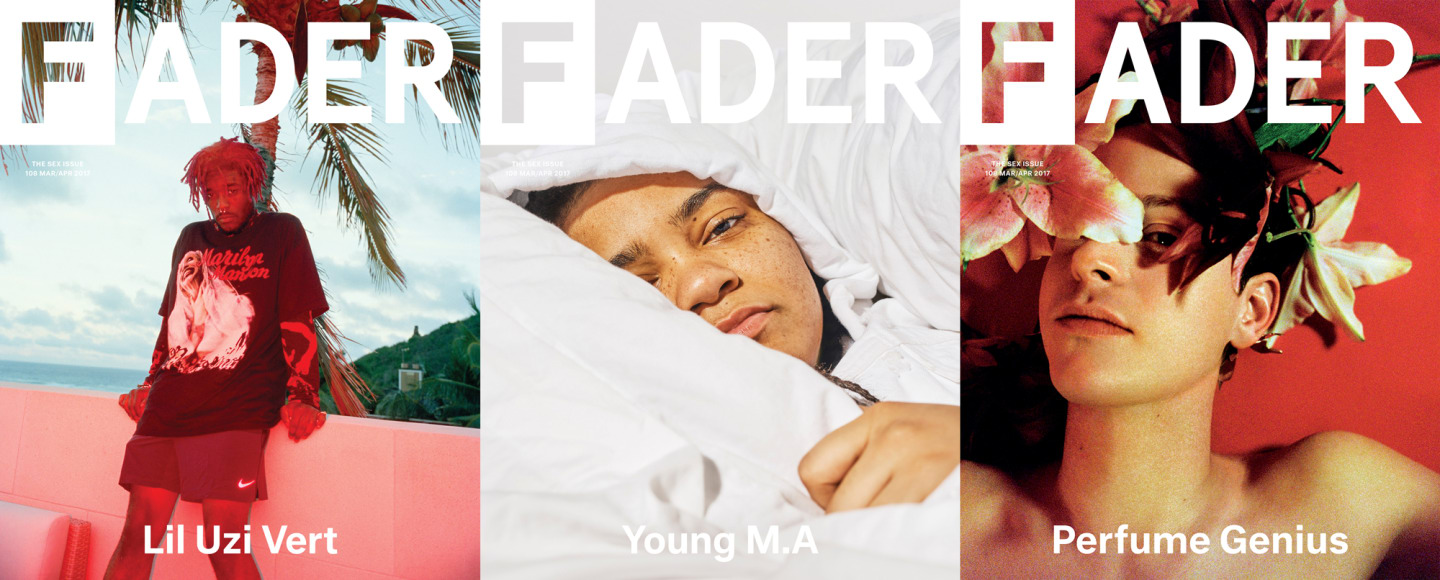 Lil Uzi Vert, Young M.A, and Perfume Genius cover The FADER's Sex Issue.
Tyler Mitchell / Cait Opperman / Cara Stricker for The FADER
Lil Uzi Vert, Young M.A, and Perfume Genius cover The FADER's Sex Issue.
Tyler Mitchell / Cait Opperman / Cara Stricker for The FADER
Going to Hawaii with Lil Uzi Vert sounded too good to be true, and it was, if not entirely. The trip happened, thanks to dozens of stakeholders from his camp, his label, and this magazine. Photos were taken and hang sessions were had. These are some of the ingredients that help make a FADER cover story what it’s meant to become — a revealing portrait that excites readers now and documents modern culture for posterity.
When a FADER cover is offered to someone, the agreement is premised upon access. That means multiple in-depth interviews with a subject, secondary interviews with people around them, and time to make meaningful photographs. This approach is about honesty and facts over any other agenda, and relies upon the belief that closeness to a subject helps achieve those things.
For our first-ever Sex Issue, we looked at what happens when people respect their urges, find outlets for their feelings, and volunteer instead of being forced. We talked to Perfume Genius about sober love and adulthood after recovery, and caught up with E-40 and his high school sweetheart as they made their home more comfortable to grow old in together. We asked experts if sex ed will ever be good, talked to a sex worker in prison for defending herself, and considered the future of gender with Young M.A, a sex symbol for the ages. And we went to Hawaii with Lil Uzi Vert, where the interviews that were promised were not really given. There was proximity, but not intimacy. In magazines as in life as in sex — sometimes people do what they want and you don’t get what you need.
During his first official briefing in January, press secretary Sean Spicer lied about the size of Trump’s inauguration crowd; later, in response, presidential adviser Kellyanne Conway offered the phrase “alternative facts.” CNN chose not to air the briefing live or in full. Instead they aired segments with context, a way to avoid taking its statements at face value. “I think the era of access journalism as we’ve known it is over,” CNN president Jeff Zucker said later that month.
Maybe Uzi understands this; that even a couple thoughtful quotes can only communicate so much, and that actions speak louder. Maybe he just wanted to go on vacation, unbothered. No matter what, he’s a great artist, not a politician. But in either case — who really wins when access journalism loses? Perhaps readers, who benefit when journalists put greater energy toward sources who might be more reliable than the subjects themselves, or perhaps journalists themselves, who shuck conventions when they aren’t formally beholden to their subjects. Perhaps it’s manipulators of all kinds, who speak directly to their loyal base and ice out opposing voices, fracturing common understanding until facts are effectively rendered meaningless. At turns it’s probably all of us, or none of us. That uncertainty is an upside-down feeling, the kind that might make you want to crawl into bed with someone you trust, and can feel confident about depending on.
